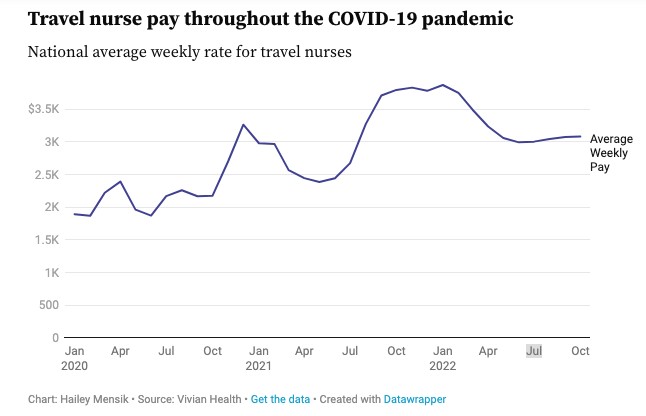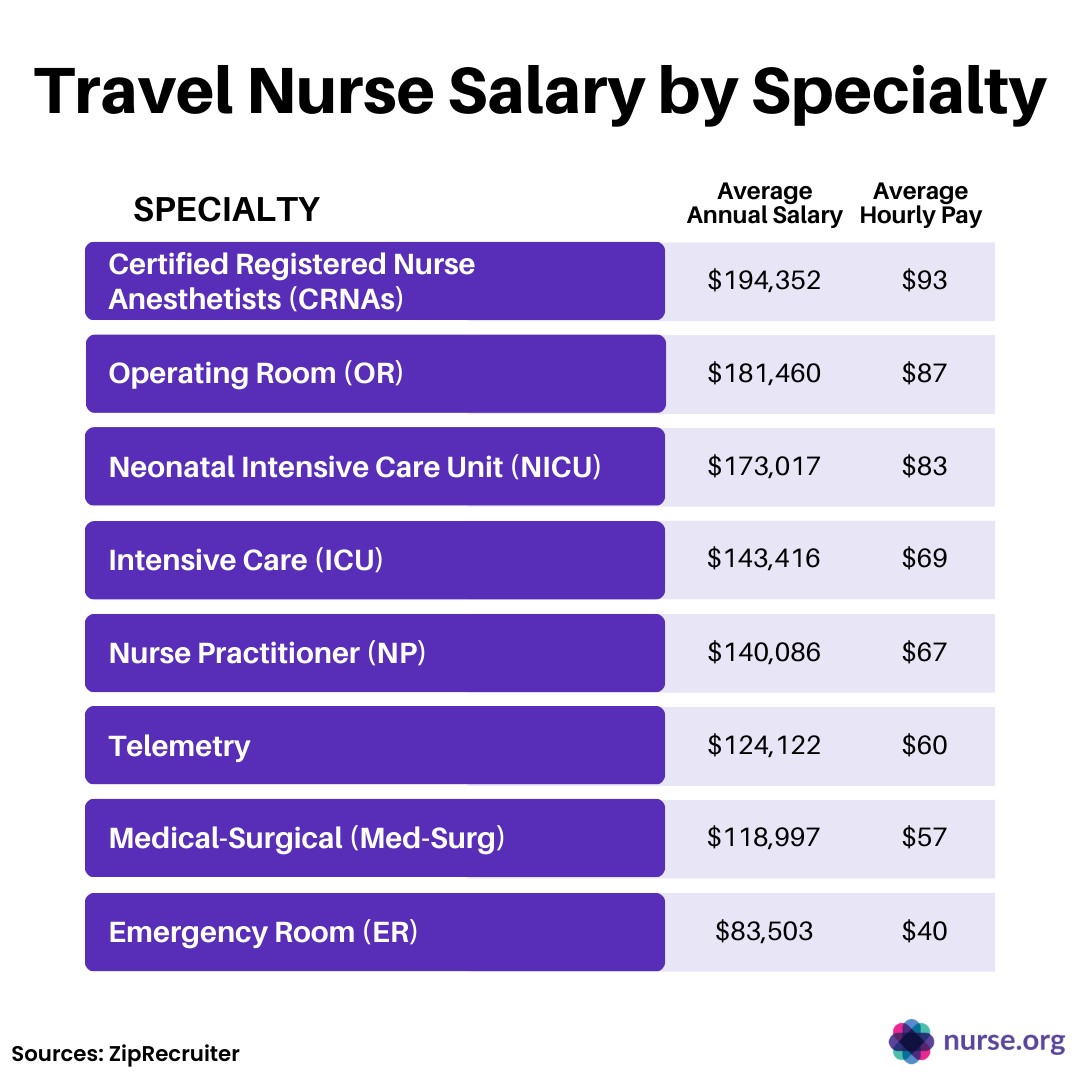Travel nurses are in demand, offering flexible career options for registered nurses seeking adventure and competitive pay. TRAVELS.EDU.VN provides insights and resources for nurses interested in exploring travel opportunities. Discover how you can leverage your nursing skills for unique experiences, career growth, and financial rewards, benefiting from career flexibility and travel opportunities.
1. What’s the Real Deal on Travel Nurse Demand Right Now?
Yes, travel nurses are still in demand, though the landscape has shifted since the peak of the pandemic. While demand may not be as high as it was in 2020-2022, opportunities remain, particularly in specialized areas and underserved locations. The need for travel nurses fluctuates based on several factors, including seasonal demands, regional healthcare needs, and hospital budgets.
Understanding the Current Travel Nurse Market Dynamics
The market for travel nurses has seen significant changes in recent years. According to Staffing Industry Analysts, the number of travel nurses doubled during the pandemic, reaching over 100,000 nationwide. However, as hospitals return to pre-pandemic staffing levels and seek more permanent solutions, demand has adjusted. Despite this shift, travel nursing remains a viable and attractive career path for many nurses.
Here’s a breakdown of key factors affecting demand:
- Seasonal Fluctuations: Demand typically increases during flu season and other times of high patient volume.
- Regional Needs: Areas with staffing shortages, rural communities, and facilities experiencing strikes or natural disasters often rely on travel nurses.
- Hospital Budgets: The cost of hiring travel nurses impacts demand. Hospitals are exploring strategies to reduce these costs, such as hiring directly and developing internal travel programs.
- Specialty: High-demand specialties like ICU and medical-surgical nursing consistently offer opportunities for travel nurses.
Where Are Travel Nurses Most Needed?
Certain regions and facilities consistently require travel nurses due to ongoing staffing challenges. Rural and underserved areas often lack permanent staff and depend on travel nurses to fill critical roles. States with large populations and numerous healthcare facilities, such as California, Texas, and Florida, continue to be prime locations for travel assignments.
Here are some specific settings where travel nurses are in high demand:
- Rural Hospitals: These facilities often struggle to attract and retain permanent staff.
- Understaffed Urban Hospitals: High patient volumes and demanding work environments can lead to staffing shortages.
- Specialty Units: Intensive care units (ICUs), emergency departments (EDs), and operating rooms (ORs) frequently require specialized travel nurses.
- Rehabilitation Centers: These centers often seek nurses with specific rehabilitation experience.
 Travel nurses collaborate in a busy emergency room, showcasing teamwork and expertise
Travel nurses collaborate in a busy emergency room, showcasing teamwork and expertise
2. What Nursing Specialties Are Most in Demand for Travel Positions?
Several nursing specialties are consistently in high demand for travel positions. Understanding which specialties are most sought after can help nurses tailor their skills and increase their opportunities in the travel nursing field.
Top Specialties for Travel Nurses
According to recent data, the following specialties are among the most in-demand for travel nurses:
- Intensive Care Unit (ICU) Nurses: Critical care nurses are always needed to provide specialized care to critically ill patients.
- Emergency Room (ER) Nurses: High-stress and fast-paced environments require experienced ER nurses to handle a variety of medical emergencies.
- Medical-Surgical (Med-Surg) Nurses: These nurses provide care for patients with a wide range of medical conditions, making them versatile and highly sought after.
- Operating Room (OR) Nurses: Also known as perioperative nurses, they assist surgeons during operations and provide pre- and post-operative care.
- Labor and Delivery (L&D) Nurses: Specialized nurses who assist women during childbirth and provide care for newborns.
Why These Specialties Are in High Demand
The consistent demand for these specialties stems from the critical nature of the care they provide and the specialized skills required. ICU and ER nurses, for example, must be able to handle high-pressure situations and make quick decisions to save lives. OR nurses need extensive knowledge of surgical procedures and sterile techniques. Med-Surg nurses must be adaptable and proficient in managing various medical conditions. L&D nurses require empathy, expertise in obstetrics, and neonatal care skills.
 A travel nurse in scrubs smiles confidently in a hospital hallway, reflecting the positive impact of her flexible career
A travel nurse in scrubs smiles confidently in a hospital hallway, reflecting the positive impact of her flexible career
3. How Much Can Travel Nurses Expect to Earn in 2024?
Travel nurse salaries can vary significantly depending on location, specialty, experience, and demand. Understanding the factors that influence pay rates can help nurses negotiate competitive contracts and maximize their earning potential.
Average Travel Nurse Salaries in 2024
As of July 2024, the average annual travel nurse salary in the United States is approximately $101,132, or $49 per hour, according to ZipRecruiter. While this is higher than the national average for registered nurses, which the Bureau of Labor Statistics (BLS) reports as $86,070 per year or $41.38 per hour, it’s essential to consider that travel nurse compensation often includes stipends and benefits that can significantly increase overall earnings.
Factors Influencing Travel Nurse Pay
Several factors can affect a travel nurse’s earning potential:
- Specialty: High-demand specialties like ICU and ER nursing typically command higher pay rates.
- Location: Assignments in high-cost-of-living areas or regions with significant staffing shortages often offer higher compensation packages.
- Experience: More experienced nurses with specialized skills are often able to negotiate higher pay rates.
- Demand: During times of increased demand, such as flu season or during a local healthcare crisis, pay rates may surge.
- Agency: Different travel nursing agencies may offer varying pay rates and benefits packages.
- Shift: Night shifts and weekend shifts often pay more than regular daytime hours.
Benefits and Stipends
In addition to base pay, travel nurses often receive benefits and stipends that can significantly increase their overall compensation. These may include:
- Housing Stipends: To cover the cost of temporary housing.
- Travel Reimbursement: For transportation to and from assignments.
- Health Insurance: Coverage for medical, dental, and vision care.
- Licensure Reimbursement: For costs associated with obtaining nursing licenses in different states.
- Completion Bonuses: Awarded upon completion of a contract.
 A travel nurse reviews patient charts in a modern hospital setting, demonstrating dedication to quality care
A travel nurse reviews patient charts in a modern hospital setting, demonstrating dedication to quality care
4. What Are the Benefits and Drawbacks of Travel Nursing?
Travel nursing offers numerous benefits, including higher pay, travel opportunities, and professional growth. However, it also comes with challenges such as adapting to new environments, managing frequent moves, and dealing with potential instability.
Benefits of Travel Nursing
- Higher Pay: Travel nurses typically earn more than staff nurses due to increased demand and the need to attract qualified professionals to temporary assignments.
- Travel Opportunities: The chance to explore new cities, states, and even countries is a major draw for many travel nurses.
- Career Growth: Exposure to different healthcare settings and patient populations can broaden a nurse’s skills and experience.
- Flexibility: Travel nurses have more control over their schedules and can often take time off between assignments.
- Variety: Working in different environments can prevent burnout and keep the job interesting.
- Networking: Travel nursing provides opportunities to meet new colleagues and build professional relationships.
- Housing and Travel Stipends: Agencies often provide stipends to cover housing and travel costs, reducing the financial burden of moving.
Drawbacks of Travel Nursing
- Instability: Frequent moves and short-term contracts can make it challenging to establish a stable home life.
- Adapting to New Environments: Travel nurses must quickly adapt to new hospital policies, procedures, and cultures.
- Licensure Requirements: Obtaining nursing licenses in multiple states can be time-consuming and expensive.
- Limited Benefits: Some agencies may offer limited or less comprehensive benefits compared to permanent positions.
- Homesickness: Being away from family and friends can be difficult for some travel nurses.
- Contract Cancellations: Hospitals may cancel contracts due to budget cuts or changes in staffing needs, leaving nurses without work.
- Lack of Familiarity: Travel nurses may not have the same level of familiarity with local resources and support systems as permanent staff.
5. How Can Nurses Find Reputable Travel Nursing Agencies?
Choosing the right travel nursing agency is crucial for a positive and rewarding experience. Researching and selecting a reputable agency can ensure that nurses receive fair pay, comprehensive benefits, and adequate support throughout their assignments.
Tips for Finding Reputable Agencies
- Research: Start by researching different travel nursing agencies online. Read reviews and testimonials from other travel nurses to get an idea of their experiences.
- Check Credentials: Ensure that the agency is properly licensed and accredited. Look for certifications from organizations like The Joint Commission.
- Ask About Benefits: Inquire about the agency’s benefits package, including health insurance, housing stipends, travel reimbursement, and licensure assistance.
- Compare Pay Rates: Compare pay rates offered by different agencies for similar assignments to ensure you’re getting a competitive offer.
- Talk to Recruiters: Speak with recruiters from several agencies to get a sense of their communication style and responsiveness.
- Read the Contract Carefully: Before signing any contract, review it carefully to understand your rights and obligations.
- Seek Recommendations: Ask colleagues or mentors for recommendations of reputable travel nursing agencies.
Questions to Ask Potential Agencies
- What is your agency’s experience in the travel nursing industry?
- What types of assignments do you offer?
- What is your pay structure and how often do you pay?
- What benefits do you offer, including health insurance, housing, and travel reimbursement?
- How do you support travel nurses during their assignments?
- What happens if my contract is canceled?
- Can I speak with current or former travel nurses who have worked with your agency?
- Do you offer continuing education opportunities or professional development resources?
 A travel nurse speaks with a friendly recruiter, highlighting the importance of clear communication and support
A travel nurse speaks with a friendly recruiter, highlighting the importance of clear communication and support
6. Are Internal Travel Programs a Good Alternative to Traditional Travel Nursing?
Internal travel programs are an increasingly popular alternative to traditional travel nursing. These programs offer nurses the opportunity to travel to different facilities within a single healthcare system, providing some of the benefits of travel nursing with added stability and familiarity.
What Are Internal Travel Programs?
Internal travel programs are offered by large health systems that allow employed nurses to travel on a short-term basis to associated hospitals. Nurses who participate in these programs typically receive higher pay than staff nurses but may have limited benefits in some cases. These programs address some of the pain points of traditional travel nursing, such as adapting to new policies and procedures and worrying about contract cancellations.
Benefits of Internal Travel Programs
- Higher Pay: Internal travel nurses typically earn more than staff nurses within the same healthcare system.
- Stability: Because nurses are employed by the health system, they have more job security than traditional travel nurses.
- Familiarity: Nurses are already familiar with the health system’s policies, procedures, and electronic health records, making it easier to transition to different facilities.
- Benefits: Internal travel nurses typically receive the same benefits as other employees of the health system.
- Reduced Stress: Less time spent learning new systems and procedures can reduce stress and improve job satisfaction.
Drawbacks of Internal Travel Programs
- Limited Travel Opportunities: Nurses are limited to traveling to facilities within the same health system, which may not offer the same variety of locations as traditional travel nursing.
- Potential Benefit Limitations: In some cases, internal travel nurses may have limited access to certain benefits compared to permanent staff.
- Less Autonomy: Nurses may have less control over their assignments and schedules compared to traditional travel nursing.
Facilities Offering Internal Travel Programs
Several major healthcare systems offer internal travel programs, including:
- University of Pittsburgh Medical Center (UPMC)
- Mercy Health System
- Advent Health
- UC Health Colorado
- Bronson Healthcare
7. How Can Travel Nurses Prepare for Assignments in Different Locations?
Preparing for travel nursing assignments involves more than just packing your bags. It requires careful planning, research, and attention to detail to ensure a smooth and successful experience.
Steps to Prepare for a Travel Nursing Assignment
- Research the Location: Learn about the city or town where you’ll be working, including the cost of living, local attractions, and transportation options.
- Obtain Necessary Licenses: Ensure you have the required nursing licenses for the state where you’ll be working.
- Arrange Housing: Secure temporary housing before you arrive, whether it’s through your agency or on your own.
- Pack Appropriately: Pack for the climate and the type of work you’ll be doing.
- Review Hospital Policies: Familiarize yourself with the hospital’s policies and procedures before you start working.
- Plan for Transportation: Arrange for transportation to and from work, whether it’s a rental car, public transportation, or ride-sharing service.
- Connect with Other Travel Nurses: Reach out to other travel nurses in the area for advice and support.
- Prepare for Culture Shock: Be open to new experiences and be prepared to adjust to a different culture.
- Get Organized: Keep important documents, such as your nursing license, contract, and insurance information, in a safe and accessible place.
Essential Documents and Items to Bring
- Nursing License(s)
- Passport and Visa (if traveling internationally)
- Contract and Agency Information
- Health Insurance Card
- Driver’s License
- Social Security Card
- Professional Liability Insurance
- Scrubs and Comfortable Shoes
- Medical Equipment (stethoscope, blood pressure cuff, etc.)
- Personal Medications
- Emergency Contact Information
8. What Skills and Qualities Are Essential for Successful Travel Nursing?
Successful travel nurses possess a unique blend of clinical skills, adaptability, and interpersonal abilities. These qualities enable them to thrive in new environments, provide high-quality patient care, and build positive relationships with colleagues.
Key Skills and Qualities
- Clinical Expertise: Strong clinical skills and knowledge are essential for providing safe and effective patient care in various settings.
- Adaptability: The ability to quickly adapt to new hospital policies, procedures, and cultures is crucial for success.
- Communication Skills: Clear and effective communication is essential for collaborating with colleagues, communicating with patients, and advocating for their needs.
- Problem-Solving Skills: Travel nurses must be able to think on their feet and solve problems independently.
- Flexibility: Being flexible and open to change is important for dealing with unexpected situations and adapting to new assignments.
- Independence: Travel nurses must be able to work independently and manage their own time and resources.
- Professionalism: Maintaining a professional demeanor and adhering to ethical standards is essential for building trust and respect.
- Empathy: Showing empathy and compassion for patients and their families is crucial for providing holistic care.
- Resilience: The ability to bounce back from setbacks and challenges is important for maintaining a positive attitude and persevering in demanding environments.
- Cultural Sensitivity: Being aware of and respectful of different cultures is essential for providing culturally competent care.
9. How Do Hospital Internal Travel Programs Compare to Travel Nursing?
Hospital internal travel programs and traditional travel nursing both offer unique benefits and drawbacks. Understanding the key differences between these options can help nurses make informed decisions about their career paths.
Key Differences
| Feature | Hospital Internal Travel Programs | Traditional Travel Nursing |
|---|---|---|
| Employer | Employed by a single healthcare system | Employed by a travel nursing agency |
| Travel Scope | Limited to facilities within the same health system | Wider range of locations, including different cities, states, and countries |
| Stability | More job security and benefits | Less job security and potentially limited benefits |
| Familiarity | Familiar with hospital policies and procedures | Must adapt to new policies and procedures at each assignment |
| Pay | Typically higher than staff nurses within the same system | Potential for higher pay rates, especially in high-demand areas |
| Control | Less control over assignments and schedules | More control over assignments and schedules |
| Paperwork | Less paperwork due to being within the same healthcare system | More paperwork because you have to deal with different agencies |
Pros and Cons of Each Option
Hospital Internal Travel Programs
- Pros: Stability, benefits, familiarity, less paperwork.
- Cons: Limited travel scope, less control over assignments.
Traditional Travel Nursing
- Pros: Wider range of locations, more control over assignments, potential for higher pay.
- Cons: Less job security, adapting to new environments, lots of paperwork.
10. What Is the Future Outlook for Travel Nursing?
The future outlook for travel nursing remains promising, despite recent shifts in demand. Several factors suggest that travel nurses will continue to play a vital role in the healthcare industry, particularly in addressing staffing shortages and providing specialized care in underserved areas.
Factors Supporting Future Demand
- Nursing Shortage: The United States is projected to face a shortage of registered nurses in the coming years, creating ongoing demand for travel nurses.
- Aging Population: The growing elderly population will require more healthcare services, increasing the need for qualified nurses.
- Technological Advancements: New technologies and virtual care models will continue to evolve the role of travel nurses, creating new opportunities for remote monitoring and telehealth services.
- Specialized Care: The demand for nurses with specialized skills, such as ICU and ER nursing, will continue to drive the need for travel nurses in these areas.
- Rural Healthcare: Rural communities will continue to rely on travel nurses to fill critical staffing gaps and provide access to quality healthcare services.
- Flexibility and Lifestyle: The flexibility and lifestyle benefits of travel nursing will continue to attract nurses seeking career advancement and travel opportunities.
Travel nursing remains a compelling career choice for nurses seeking adventure, competitive pay, and professional growth. Whether you’re drawn to the flexibility of short-term assignments, the opportunity to explore new locations, or the chance to make a difference in underserved communities, travel nursing offers a unique and rewarding path.
Are you ready to take the next step in your travel nursing journey? Contact TRAVELS.EDU.VN today at +1 (707) 257-5400 or visit our website at TRAVELS.EDU.VN to learn more about our exciting opportunities and personalized support. Let us help you find the perfect travel assignment to match your skills, interests, and career goals. Our office is located at 123 Main St, Napa, CA 94559, United States. Let travels.edu.vn help you start your adventure today.
FAQ: Your Questions About Travel Nursing Answered
- Is travel nursing a good career choice? Yes, it offers high pay, flexibility, and travel opportunities.
- How much do travel nurses make? Average annual salary is around $101,132 but varies by specialty and location.
- What are the requirements to become a travel nurse? Requires an active RN license, experience, and relevant certifications.
- How do I find a reputable travel nursing agency? Research online, check credentials, and ask for recommendations.
- What specialties are in high demand for travel nurses? ICU, ER, Med-Surg, OR, and L&D nurses are highly sought after.
- Are there internal travel programs available? Yes, many healthcare systems offer internal travel programs.
- What are the pros and cons of travel nursing? Pros include higher pay and travel; cons include instability and adapting to new environments.
- How can I prepare for a travel nursing assignment? Research the location, obtain licenses, and arrange housing.
- What skills are essential for travel nursing? Adaptability, clinical expertise, communication, and problem-solving skills.
- What is the future outlook for travel nursing? The outlook remains promising due to nursing shortages and aging population.